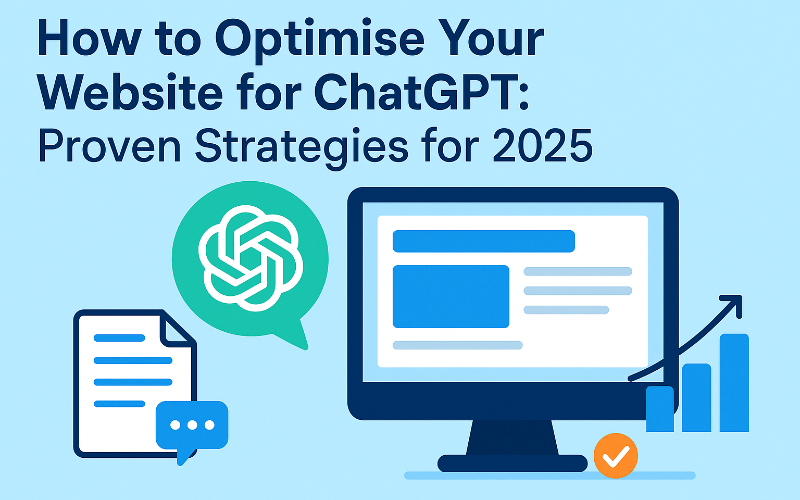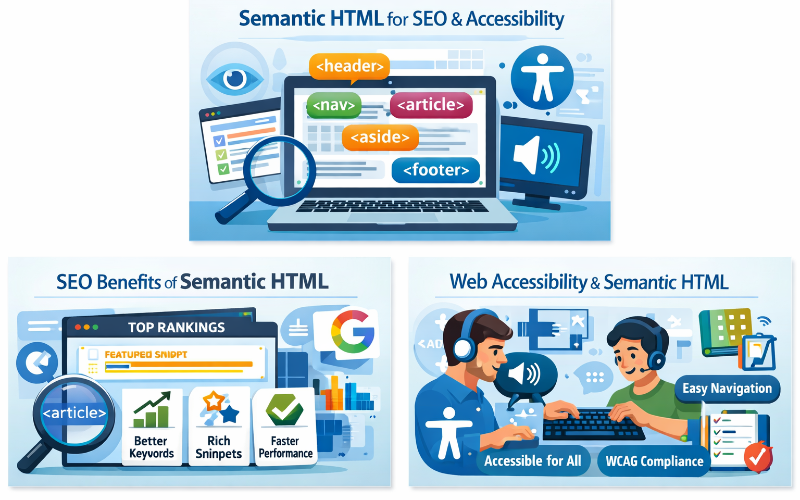19.09.2025
Artificial intelligence is changing the way people search for and consume information. With tools like ChatGPT, users can now ask complex questions and receive instant, conversational answers without clicking through multiple links. For website owners, this means optimising your content isn’t just about ranking in Google—it’s about making sure your content is AI-friendly and discoverable within ChatGPT responses.
In this guide, we’ll explore practical steps on how to optimise your website for ChatGPT so your content doesn’t get left behind in the AI-driven search revolution.
Why Optimising for ChatGPT Matters
The Rise of AI-Driven Search
AI chatbots like ChatGPT are fast becoming alternative gateways to information. Instead of typing a query into Google, users are increasingly asking AI tools for recommendations, tutorials, and explanations. If your site isn’t optimised for this shift, you risk missing out on valuable traffic.
ChatGPT vs. Traditional Search Engines
While Google relies heavily on keyword matching and ranking signals, ChatGPT focuses on context, authority, and clarity. To appear in ChatGPT answers, your website must provide well-structured, authoritative, and natural-sounding content.
Understanding How ChatGPT Sources Information
The Role of OpenAI’s Training Data
ChatGPT was trained on vast amounts of text data. While it doesn’t crawl the web in real-time like Google, newer versions integrate with live search engines, meaning fresh, optimised content can make its way into responses.
Integration with Search Engines Like Bing
Microsoft has integrated ChatGPT into Bing search, meaning your SEO efforts directly influence AI visibility. By optimising your website correctly, you increase the chances of your content being surfaced in AI-generated answers.
Key SEO Foundations Still Relevant
Quality Content Creation
High-quality, original, and user-focused content remains king. Your content should directly answer questions while showcasing expertise, trust, and authority.
Technical SEO Essentials
A well-structured website with proper meta tags, sitemaps, clean URLs, and HTTPS security ensures both search engines and AI tools can easily process your site.
Optimising Your Website for ChatGPT
Structuring Content for Natural Language Processing
AI tools prefer content written in a natural, conversational tone. Use clear headings, short paragraphs, and direct answers to common queries.
Creating Conversational and Context-Rich Content
Instead of robotic keyword stuffing, write as if you’re speaking to your audience. Context-rich explanations help ChatGPT pull useful snippets from your site.
Leveraging Schema Markup and Structured Data
Schema markup helps AI and search engines understand your content. Adding FAQ schema, product schema, or article schema increases the chances of your content being quoted directly in AI responses.
Building Topical Authority and Expertise
Publishing a cluster of articles around your niche signals authority. For instance, if you run a fitness blog, covering everything from workout routines to diet plans makes ChatGPT more likely to reference your site.
Enhancing User Experience for AI-driven Discovery
Mobile-First and Fast-Loading Websites
Most AI-driven searches happen on mobile. Make sure your website loads quickly and adapts perfectly to small screens.
Accessibility and User-Friendly Navigation
Simple, accessible websites are more likely to be trusted by AI-driven search engines. Ensure your site is easy to navigate with clear headings and descriptive alt text for images.
Content Strategies for ChatGPT Optimisation
Answering Questions Directly (FAQ-Style Content)
AI thrives on Q&A. Create dedicated FAQ sections that directly answer user questions in plain language.
Long-Form vs. Short-Form Content
While concise answers are important, in-depth long-form content is more valuable for ChatGPT. A 2,000+ word article that covers a topic comprehensively is more likely to be referenced.
Using Semantic Keywords and Context
Instead of repeating one keyword, include semantic variations and related phrases. This helps ChatGPT understand context and recommend your content.
Linking Strategies That Boost AI Visibility
Internal Linking for Context Building
Interlink your related posts to help AI map your site’s topical authority.
External Links and Credibility
Citing credible sources (like Google’s SEO starter guide) strengthens your site’s trust and increases authority in AI-driven search results.
Measuring Success in ChatGPT Optimisation
Key Metrics to Track
Look at organic traffic, engagement rates, and mentions in AI-driven search tools.
Tools for Monitoring AI-driven Traffic
Keep an eye on Bing Webmaster Tools, Google Search Console, and AI analytics platforms to measure your site’s reach in AI-generated answers.
Common Mistakes to Avoid
- Over-Optimisation and Keyword Stuffing: AI penalises unnatural writing. Keep your content authentic and user-focused.
- Ignoring User Intent: Don’t just chase keywords—focus on answering the user’s intent.
Future of SEO in the Age of ChatGPT
Predictions for AI-Driven Search
Expect ChatGPT and similar tools to play a bigger role in daily search habits. Websites optimised for AI will stand out.
How to Stay Ahead of the Curve
Regularly update your content, embrace structured data, and publish conversational, user-friendly articles to future-proof your site.
FAQs on Optimising for ChatGPT
- How is optimising for ChatGPT different from Google SEO? Optimising for ChatGPT requires more conversational, context-driven content rather than just keyword targeting.
- Does ChatGPT pull data directly from my website? It doesn’t crawl in real-time, but if your content is indexed by Bing or Google, ChatGPT may reference it.
- Should I create FAQ pages to help with AI optimisation? Yes, FAQ sections are excellent because they align perfectly with AI’s Q&A style.
- Do backlinks still matter for ChatGPT optimisation? Absolutely. Backlinks signal credibility and authority, increasing your chances of being cited by AI.
- What type of content is most likely to appear in ChatGPT answers? In-depth, well-structured, authoritative guides that answer specific questions clearly.
- Can schema markup really improve ChatGPT visibility? Yes, schema helps AI better interpret your content and enhances your chances of being featured in responses.
Conclusion
The future of search is conversational, and optimising your website for ChatGPT ensures you stay ahead in the AI-driven landscape. By creating authoritative, structured, and conversational content, you can position your site to be cited by ChatGPT and other AI tools—bringing more visibility, traffic, and authority to your brand.






